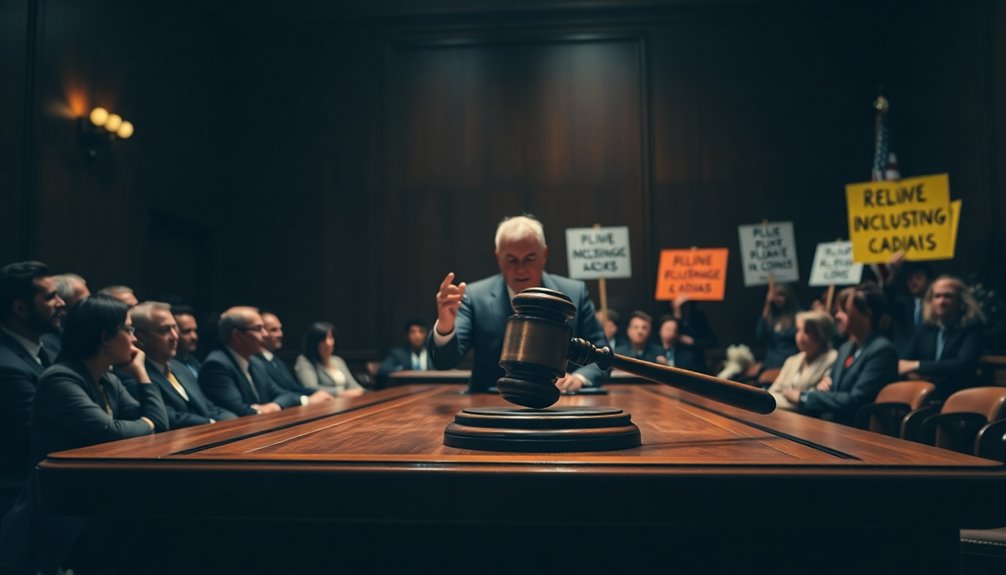The controversy surrounding the dropped corruption charges against Eric Adams raises serious doubts about the Trump administration's potential use of justice as a political weapon. Critics point to the decision made by the Justice Department, especially after a series of high-profile resignations, as indicative of a troubling pattern of political interference. These events threaten public trust in the legal system, leaving many questioning the integrity of the Justice Department. There's much more to uncover about this unfolding situation.
Key Takeaways
- The Justice Department's decision to drop the Adams case raises concerns about political influence in legal decisions during the Trump administration.
- Allegations of alignment with Trump's immigration policies suggest potential favoritism in the legal process surrounding the Adams case.
- Resignations within the Justice Department reflect ethical dilemmas and raise questions about the integrity of its operations under political pressure.
- Critics draw parallels between the Adams case and historical political interference, undermining public trust in the justice system's independence.
- The controversy highlights fears that the justice system could be weaponized against political opponents, eroding the rule of law.

The recent decision by the Justice Department to drop the corruption case against New York City Mayor Eric Adams has ignited a fierce controversy, raising serious questions about political interference in the legal system. You can't ignore the fact that this move followed a meeting between Justice Department lawyers and Adams' attorneys, where senior officials discussed the case. The charges included bribery, conspiracy, and campaign finance violations, all of which Adams has pleaded not guilty to.
Now, the fallout has been significant, with notable resignations within the Justice Department, including the acting US attorney for the Southern District of New York. Critics are already drawing parallels to the infamous "Saturday Night Massacre" from the Watergate scandal, highlighting fears of political meddling. Some suggest that Adams' alignment with Trump's immigration policies might've influenced this decision, although his team denies any such connection. Charges against Adams may be reconsidered post the November 2025 mayoral election, adding another layer of complexity to the situation.
You can sense the brewing crisis within the Justice Department as multiple high-ranking officials step down, raising alarms about the integrity of the justice system. Legally and ethically, the decision to drop the case without a thorough evaluation of the evidence is troubling. You might wonder what kind of precedent this sets, allowing public officials to dodge corruption allegations simply because of their positions.
The resignations of senior prosecutors provide a clear indication of the ethical dilemmas currently plaguing the Justice Department. The public reaction has been intense, with many questioning the decision-making process of the Justice Department. Judicial responses reflect critical concerns as well, fearing that political interference could erode public trust in the legal system.
Ultimately, this controversy underscores the necessity for a clear separation between the Justice Department and the White House to protect the rule of law. As the situation unfolds, it highlights the challenges faced by the judiciary in checking executive power, especially under the Trump administration.
Frequently Asked Questions
What Were the Key Allegations in the Adams Case?
In the Adams case, you'll find key allegations involving corruption, such as accepting illegal campaign contributions and bribes.
Adams allegedly interacted with Turkish officials who provided lavish travel perks and sought favors in return.
Prosecutors claimed he directed aides to solicit foreign donations and disguise them, raising serious legal concerns about foreign involvement in U.S. elections.
These charges paint a troubling picture of potential quid pro quo arrangements affecting immigration enforcement.
How Did the Trump Administration Respond to the Controversy?
When it comes to political maneuvers, the Trump administration sure knows how to play their cards right.
In response to the controversy, they emphasized that dropping the charges against Mayor Adams was a necessary step to ensure cooperation on immigration issues.
Trump himself suggested that Adams faced unfair treatment, indicating a potential for future support.
The administration framed the decision as a strategic move rather than an act of political interference, aiming to maintain stability.
What Impact Did the Adams Case Have on Public Opinion?
The Adams case significantly sways public opinion about the integrity of the justice system.
You might notice that many people express concern over potential political interference, fearing it undermines impartiality.
As the media extensively covers the situation, it deepens the divide among supporters and opponents of the involved parties.
This growing skepticism could lead to a decline in trust towards legal institutions and an increased demand for accountability within the justice system.
Are There Similar Cases Involving Alleged Misuse of Justice?
Yes, there are several cases involving alleged misuse of justice. You might recall the indictment of Donald Trump, which some view as politically motivated.
Similarly, the Hunter Biden case raises questions about selective enforcement. The McDonnell precedent highlights concerns about prosecutorial overreach.
Additionally, historical election disputes, like the 2000 Gore vs. Bush case, show how political actions weren't criminalized, adding to the debate about justice's integrity in political contexts.
How Did Legal Experts View the Adams Case?
Legal experts view the Adams case as a crucial test of prosecutorial independence.
They express concerns about the decision to drop charges, arguing it reflects potential political influence over the Justice Department.
You'll notice that many highlight the importance of maintaining a clear separation between politics and legal proceedings.
This case, they say, could set a troubling precedent, allowing public officials to evade accountability based on their positions, undermining trust in the legal system.
Conclusion
The Adams case has ignited a firestorm of debate, revealing deep cracks in the foundation of justice during the Trump administration. As you sift through the ashes of this controversy, it's clear that justice was wielded like a double-edged sword, leaving many to question its true purpose. With trust eroded and biases exposed, you can't help but wonder: can we ever rebuild the integrity of our legal system, or are we destined to repeat history's mistakes?










